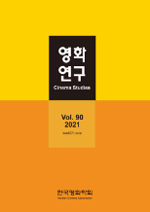- 영문명
- The “City a nd Sanitation” Discourse on Movie Theaters of the Early 1 970s: Focus on Second-run Movie Theaters near Bujeon Station, Busan
- 발행기관
- 한국영화학회
- 저자명
- 위경혜
- 간행물 정보
- 『영화연구』제90호, 373~400쪽, 전체 28쪽
- 주제분류
- 예술체육 > 예술일반
- 파일형태
- 발행일자
- 2021.12.31
6,160원
구매일시로부터 72시간 이내에 다운로드 가능합니다.
이 학술논문 정보는 (주)교보문고와 각 발행기관 사이에 저작물 이용 계약이 체결된 것으로, 교보문고를 통해 제공되고 있습니다.

국문 초록
이 글은 1969년 전국적인 콜레라 확산 상황에서 부산시 부전역 인근 재개봉관을 중심으로 극장을 둘러싼 위생 담론과 그것의 정치적 효과를 살폈다. 부전역 인근 재개봉관은 미군 부대와 대규모 시장 그리고 성매매 집창촌 등 물류와 인구이동이 빈번한 곳에 자리하였다. 하지만 전국적인 재해 발생에도 불구하고 극장위생 실태조사는 형식적인 절차에 그쳤으며, 삼선개헌과 미군 철수와 같은 사회적 재난 앞에서 뒷전으로 물러났다. 게다가 극장 공간의 위생 문제에 적극적으로대처할 관련 조항은 공연법에 제시되지 않았다. 이러한 상황에서 부전역 앞 성매매 집창촌 인근 재개봉관은 불결과 혐오의 장소로 인식되었다. 이는 수인성 질병과 관련된 부산의 분뇨처리와 식수 관리 등생활세계 문제와 연관되었다. 재개봉관은 불법과 범죄의 공간이라는 낙인이 찍혔는데, 이는 삼선개헌이라는 국가 폭력을 가리는 구실로 작용하였다. 불법 공간이라는 혐의로부터 일정한 거리를 두었던 개봉관 역시 탈세 혐의를 받는 감시의 대상이었다. 다시 말하여, 1970년대 초반 부산의 재개봉관에 대한 부정적인 의미부여는 정권 유지를 위협하는 잠재적 저항 집단으로서 청소년과 노동자 계층에 대한 통치 전략이었다. 나아가 사회 정화 대상으로서 재개봉관에 관한 명명은 한국전쟁 이후 피란 도시로 변한 부산의 극장 문화를 보여주었다. 1950년대 설립된아동극장이 전쟁고아와 부랑자 구호를 내세웠다면, 1970년대 초반 재개봉관은 이들에 대한 통제의 담론을 투사하는 곳이었다. 이는 1970년대 중반 형제복지원으로 대표되는 사회적 소수에 대한 국가 폭력의 정당화를 향하고 있었다.
영문 초록
This article examines the sanitation discourse surrounding the second-run movie theaters near Bujeon Station, Busan, in the context of a nationwide cholera outbreak in 1969, and its political implications. Second-run movie theaters proliferated in the crowded areas near Bujeon Station that housed US military bases, large markets, and brothels. Despite the rapid outbreak and spread of cholera, administrative authorities were perfunctory in implementing measures for disease surveillance and quarantine for movie theatres because attention was diverted more toward political issues such as the constitutional amendment for dictatorship and the withdrawal of the US military forces from Korea. Moreover, the Performance Act of that time did not contain relevant provisions to address the issue of movie theater sanitation. These circumstances led to a perception of second-run movie theaters near the brothels in front of Bujeon Station as places reeking of filth and squalor. Hence, they were dubbed the “honey bucket.” This state of affairs in Busan was an outcome of sanitation and hygiene issues, such as poor waste disposal mechanisms and lack of clean drinking water, which, in turn, spread water-borne diseases. Second-run movie theaters were also stigmatized as a space of illegality and crime, which served as an excuse for state violence in the name of constitutional amendment and extended the Park Chung-hee government’s term in office. The first-run movie theaters, which remained relatively free of allegations as a place for illicit activities, also came under scrutiny for tax evasion. In other words, the negative connotation attached to Busan’s second-run movie theaters in the early 1970s was in fact a government strategy to target the youth and working class, which was a potential resistance group that threatened the regime’s survival. Furthermore, designating second-run movie theaters as targets for social purification revealed the cultural landscape surrounding movie theaters in Busan, which had transformed into a refugee city following the Korean War. While the children’s theater was established in the 1950s to promote relief for war orphans and vagrants, second-run movie theaters, in the early 1970s, became places where the state could publicize the discourse of filth and exert control over local residents. This move was aimed at justifying state violence against the social minority represented by the case of the Brotherhood Welfare Center in Busan.
목차
1. 들어가며
2. 부전역 인근 지역의 이중적 성격과 방역의 실패
3. 재개봉관에 대한 ‘똥통’ 담론: 불결과 혐오의 공간
4. 방역보다 중요한 개봉관의 세금 포탈 문제
5. 정화의 대상으로서 재개봉관
6. 나가며
키워드
해당간행물 수록 논문
- 자전적 영화에서 내면의식을 나타내는 사운드디자인 기법 연구
- 오즈 야스지로의 ‘일본적인 것’의 전후(戰後)적 의미
- 시네마 로보틱스 그리고 디지털 미장센
- 영화연구 게재논문 투고, 심사(수정), 게재확정일 외
- 1970년대 초반 도시와 극장 위생
- 벨라 타르 영화 이미지의 시간의 형식에서 차별화된 양식 분석
- 오즈 야스지로의 <만춘(晩春)>과 홍상수의 <인트로덕션> 비교연구
- 균형-재균형 서사 구조에 따른 단편 애니메이션의 서사 초점 분석
- 아보우나따라의 긴급영화
- 영화 <기생충>의 음악적 변증법
- 인터페이스-스크린, 응시와 봉합 드러내기
- 대학 교육의 현재와 비대면 교육의 방향 연구
- 김일성 유일체제기 북한영화의 미국 표상 연구 (1972∼1994)
- 다르덴 형제의 영화적 현실 공간, ‘노동의 장’에 나타난 변증법적 헤게모니
- 영화연구 제90호 목차
참고문헌
관련논문
예술체육 > 예술일반분야 BEST
- 생성형 AI 도구와 디자이너의 협업 프로세스 개발 - 이미지를 통한 아이디어 확산에서 고해상도 렌더링까지
- 영화 [올드보이]와 소포클레스 「오이디푸스 왕」의 상동성 연구
- ‘일과 삶의 균형(Work-Life Balance)’ 척도 개발을 위한 연구
예술체육 > 예술일반분야 NEW
- Z세대 생활체육 동호인들의 SNS 중독 경향성과 불안정 성인애착이 완벽주의적 자기제시 및 우울에 미치는 영향
- 즐거움과 몰입을 통한 수익성 기대가 NFT 구매 의도에 미치는 매개효과 분석: UTAUT2와 합리적 무관심(RI)을 중심으로
- 생태체험이 청소년의 자연친밀감, 환경태도, 환경행동의도에 미치는 영향
최근 이용한 논문
교보eBook 첫 방문을 환영 합니다!

신규가입 혜택 지급이 완료 되었습니다.
바로 사용 가능한 교보e캐시 1,000원 (유효기간 7일)
지금 바로 교보eBook의 다양한 콘텐츠를 이용해 보세요!



